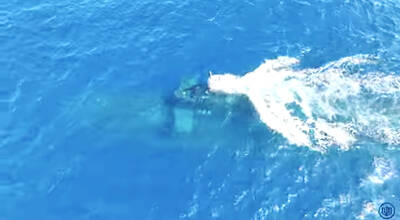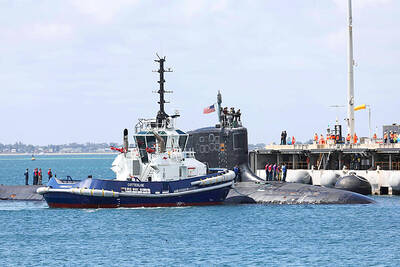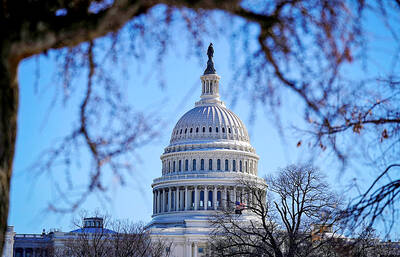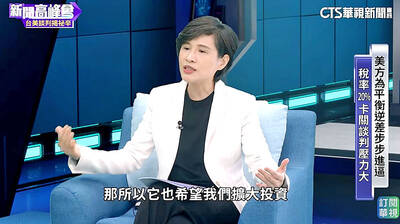Premier Su Tseng-chang (
Su had planned to make a celebratory announcement of the policy adjustment from Kinmen, but was forced to cancel his symbolic speech there when bad weather left him stranded at Taipei's Songshan Airport.
The government allows postal, cargo and personal transport via sea links between Kinmen and Xiamen, as well as Matsu and Fuzhou under the "small three links." Regulations restrict the exchanges to residents of Kinmen and Matsu, traveling in a group with a minimum of 10 people.
However, Su announced that starting next Monday, the government will suspend the minimum group requirement -- permitting individuals to travel alone -- and will add a new shipping route between Kinmen and Quanzhou on June 1.
"This idea came from Chinese Nationalist Party [KMT] Legislator Tsao Erh-chang (
In addition, people who are registered residents of Kinmen or Matsu for at least six months will also be allowed to use the small three links to travel to and from China accompanied by dependents and relatives who do not live on the islands.
Taiwanese businesspeople with operations in China, veterans who were born in Fujian Province or who have Fujianese ancestry and Fujian residents married to Taiwanese may also use the small three links.
The small three links were implemented on Jan. 1, 2001. In the first year, approximately 25,000 people traveled using the links. That number has climbed steadily, and last year 555,000 travelers had taken advantage of the links to travel to China.
Su also extended an invitation to the Chinese government to participate in search-and-rescue drills in the area.
Su said the two governments should be able to cooperate more effectively during such operations to ensure the safety of passengers who travel between Taiwan and China by sea.
"If they [Chinese rescuers] and we are familiar with the drills, we will be able to help whoever needs help at the first instance, and could save a lot of lives should an accident take place," Su said.
"We believe that the relationship between Taiwan and China should be to help each other instead of fight each other," he said. "I must say, these new decisions were the results of our brainstorming instead of impromptu statements."
Su said that President Chen Shui-bian (
The premier was planning to lead a group of 45 reporters to land on Kinmen and make his announcements there. However, the continuous heavy rain forced the air force to cancel the flight. Su then organized a press conference at the Songshan air base.

CSBC Corp, Taiwan (台灣國際造船) yesterday released the first video documenting the submerged sea trials of Taiwan’s indigenous defense submarine prototype, the Hai Kun (海鯤), or Narwhal, showing underwater navigation and the launch of countermeasures. The footage shows the vessel’s first dive, steering and control system tests, and the raising and lowering of the periscope and antenna masts. It offered a rare look at the progress in the submarine’s sea acceptance tests. The Hai Kun carried out its first shallow-water diving trial late last month and has since completed four submerged tests, CSBC said. The newly released video compiles images recorded from Jan. 29 to

DETERRENCE EFFORTS: Washington and partners hope demonstrations of force would convince Beijing that military action against Taiwan would carry high costs The US is considering using HMAS Stirling in Western Australia as a forward base to strengthen its naval posture in a potential conflict with China, particularly over Taiwan, the Wall Street Journal reported on Saturday. As part of its Indo-Pacific strategy, Washington plans to deploy up to four nuclear-powered submarines at Stirling starting in 2027, providing a base near potential hot spots such as Taiwan and the South China Sea. The move also aims to enhance military integration with Pacific allies under the Australia-UK-US trilateral security partnership, the report said. Currently, US submarines operate from Guam, but the island could

RESTRAINTS: Should China’s actions pose any threat to Taiwan’s security, economic or social systems, China would be excluded from major financial institutions, the bill says The US House of Representatives on Monday passed the PROTECT Taiwan Act, which states that Washington would exclude China from participating in major global financial organizations if its actions directly threaten Taiwan’s security. The bill, proposed by Republican Representative Frank Lucas, passed with 395 votes in favor and two against. It stipulates that if China’s actions pose any threat to Taiwan’s security, economic or social systems, the US would, “to the maximum extent practicable,” exclude Beijing from international financial institutions, including the G20, the Bank for International Settlements and the Financial Stability Board. The bill makes it clear that China must be prepared

Taiwanese trade negotiators told Washington that Taipei would not relocate 40 percent of its semiconductor production to the US, and that its most advanced technologies would remain in the nation, Vice Premier Cheng Li-chiun (鄭麗君) said on Sunday. “I told the US side very clearly — that’s impossible,” Cheng, who led the negotiation team, said in an interview that aired on Sunday night on Chinese Television System. Cheng was referring to remarks last month by US Secretary of Commerce Howard Lutnick, in which he said his goal was to bring 40 percent of Taiwan’s chip supply chain to the US Taiwan’s almost